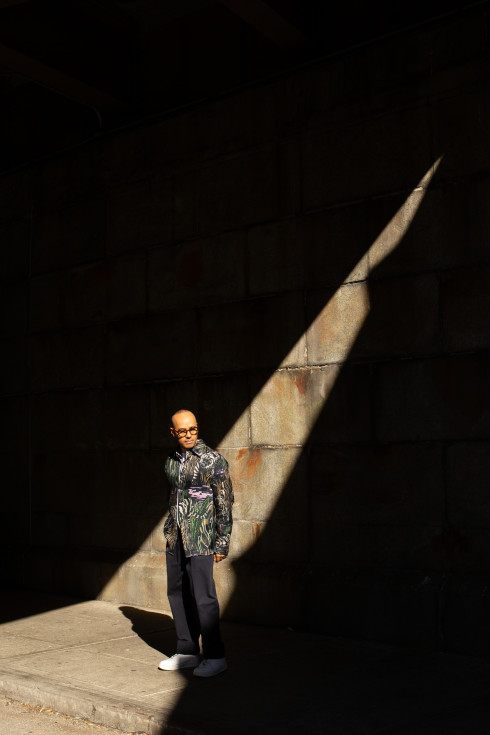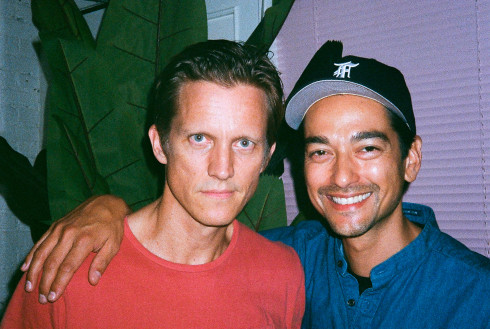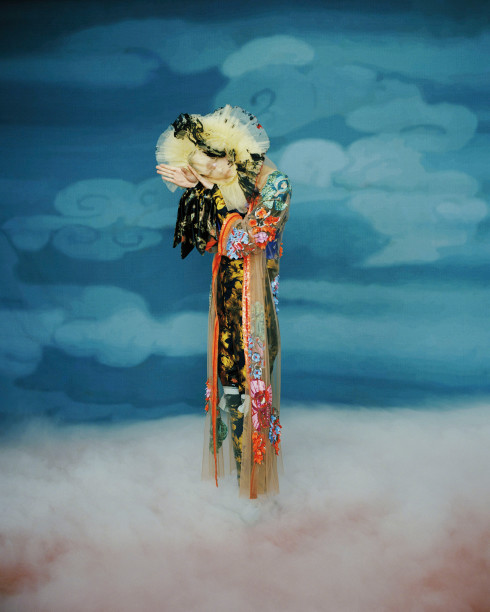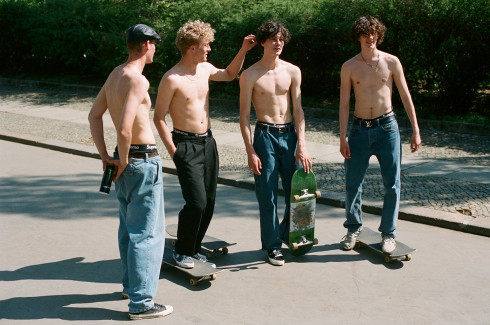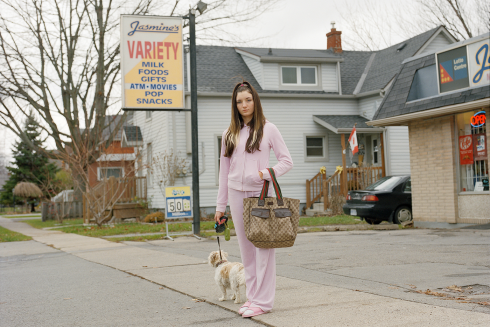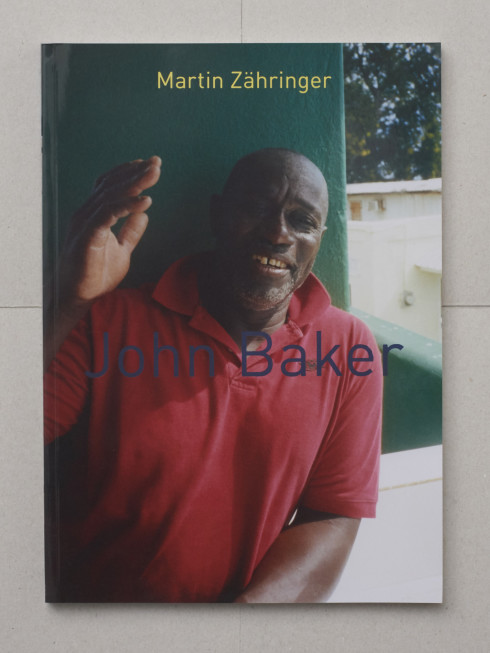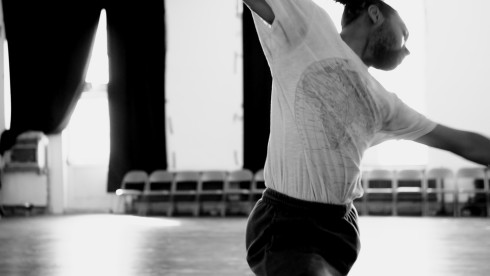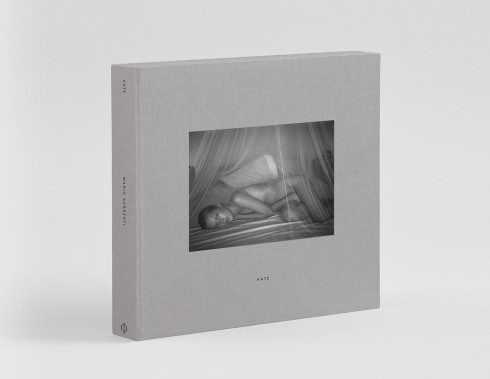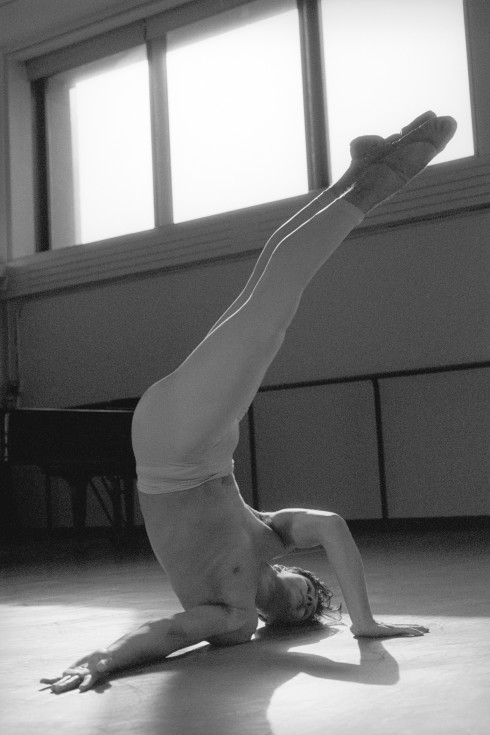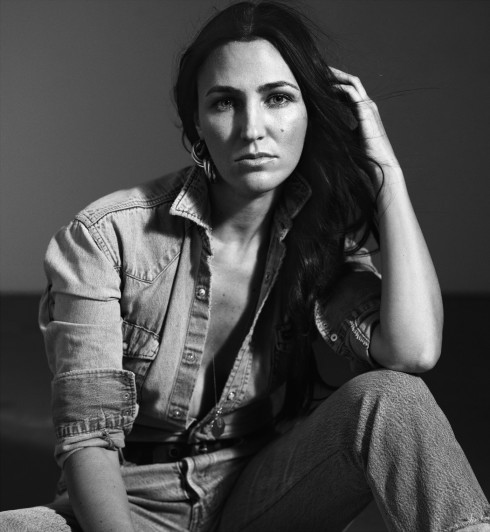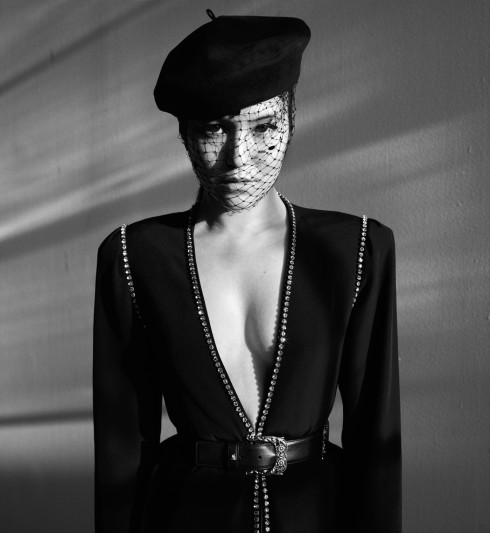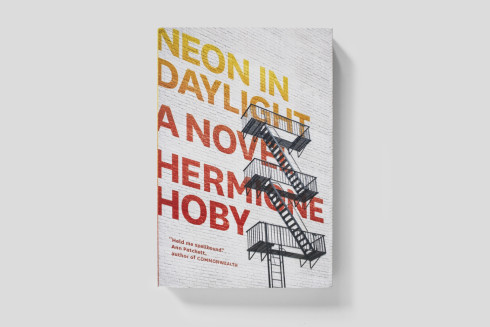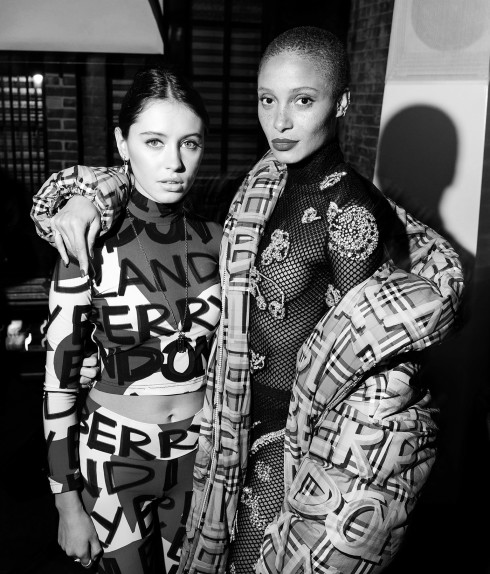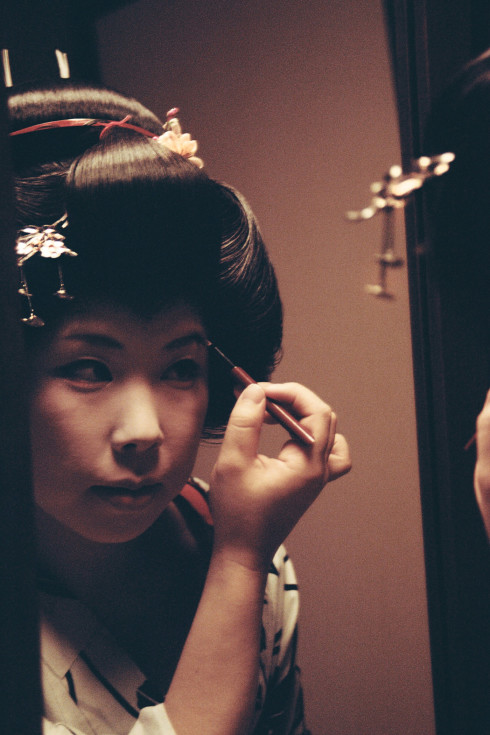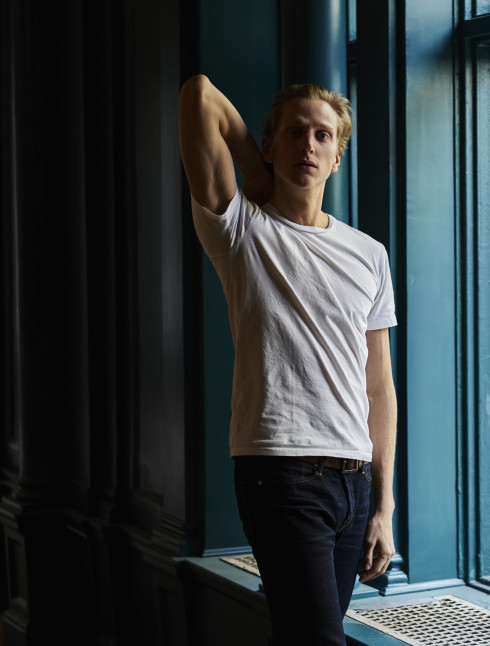TLM09: CULTURE PROJECT
Three months ago, the Culture Project stage was showered in tiny sparkling LED’s, while the actors, wearing mirrorball masks, recited lines from a Tennessee Williams play that had never been staged before. In Masks Outrageous and Austere, one of the first productions to inhabit the company’s new space at 45 Bleecker Street, was a breath of shiny air, using hundreds of tiny lights, technological flourishes, and sharp costumes that joined Southern elegance with sinister digital opulence. Set in an unknown coastal location, the play, Williams’ last, centers on the world’s richest woman and her dysfunctional allegorical neighbors, taking a more experimental route than his better-known works such as The Glass Menagerie or A Streetcar Named Desire. It’s an odd part of his output, but an eerily pertinent satire of the haves and the have-too-muches.
A few weeks later, the stage sat nearly empty save for a ladder and the odd light or two. It will be refilled with objects and people as new shows roll in, but ideas and thoughts lingered even in the emptiness, echoes of the year that had passed since Culture Project returned to Bleecker Street as a permanent home to showcase its cutting-edge, controversial, politicized productions.
“There’s something to be said for having one’s spirits uplifted. If you’re looking at life through a lens of fatigue and imperfection, and you have a chance to see something from a fresh perspective, it might provide you with solutions,” says Allan Buchmann, the company’s artistic director and activist founder. “But there’s still a question of whether you want to be distracted or engaged. I’m on the side of engagement.” In the 1960s, Buchmann rose up as a well-respected piano restorer with clients that included Keith Richards and trustees of the Picasso and Stradivarius estates. It was a good life, but one limited in scope and impact.
So in 1996, Buchmann, cool in person but impulsive and daring in spirit, converted his Upper East Side piano factory into an all-white theater house when, following the Gulf War and an unstable economy, business began to dry up. He rented the space out to other theater companies and artists, and tried his own hand at staged readings and adaptations of literature for a small group of committed fans. One weekend, Buchmann and company staged twenty-three of Anton Chekhov’s short stories and plays scored to Mussorgsky’s Pictures at an Exhibition and set underneath projections of paintings of Russian peasant food taken from the Hermitage. These experiments were exciting, but they were not a way to make a living. Nor were they a way to make a difference.
Buchmann had never really liked the Upper East Side. It wasn’t the place to be making the kind of theater he wanted to make. He began eyeing spaces downtown, where his work might be better received and have a greater impact, but he didn’t have the means to move south at first. The opportunity came in 2000, when an abandoned lumberyard at 45 Bleecker Street became available. The company purchased the space and dutifully began renovations, but a combination of inexperience and insufficient funds meant Culture Project would have to show in various New York theater spaces, some more prestigious than others, for over a decade.
But back in 2000, it all seemed to be working out. Culture Project had a new space and a new audience: The theater sits in Community Board 2, which, to Buchmann’s delight, is known for housing a community of young activists. Then 9/11 happened, and funds dried up. It became more difficult to run shows that overtly attacked the government—this being the time of Giuliani and Freedom Fries and rampant nationalism—but Culture Project was given another blessing in the form of 2002’s The Exonerated, a gripping and poignant play based on the real-life stories of inmates on death row. More documentary than sermon, The Exonerated attacked capital punishment and humanized the sometimes-wrongly accused prisoners sentenced to inhumane treatment. The Exonerated was a huge hit, selling out in New York for eighteen months before showing in theaters around the world, attracting a strong celebrity ensemble cast and crystallizing Culture Project’s purpose. It was the catalyst that turned Culture Project from an experimental safe house into a political stronghold. The sudden success of The Exonerated led to a series of other politically minded plays, including Guardians, which slammed torture at Abu Ghraib, and Women Center Stage, which challenged gender-based discrimination. It also led to a rapid increase in costs, which again threatened to put Culture Project back into serious debt. In 2012, the theater’s mission includes both glitz and grit, shows and forums that attract dignitaries as well as experimental plays more likely to pull in new audiences.
Now the company has finally returned to a complete and (mostly) paid-for Bleecker Street theater, where Culture Project has a new, two-theater home. Avant-garde productions like In Masks Outrageous and Austere are flashbacks to Buchmann’s earlier years staging literary readings on the Upper East Side, but Culture Project is different now, with a new sense of purpose. Along with continuing its tradition of featuring new experimental theater, the company is also incubating more politically progressive plays, planning community partnerships, and promoting issue-based festivals.
Just this year alone, Culture Project set its sights on biased police frisking in Blueprint for Accountability and what Buchmann calls the most important election ever due to our current incredible wealth inequality: “It’s more than financial, it’s moral. It’s a question of what kind of nation we want to have and how we want to treat the people in it.” Culture Project also hosted the Impact 2012 Festival this summer, using works concerning the upcoming election as a way to shape the political discussion. The run featured cultural lightning rods like José Antonio Vargas, who appeared on the cover of Time for “coming out” as an illegal immigrant, and spoke about controversial issues like undocumented workers.
More importantly, Buchmann is leaving the door open for anyone to submit an idea and present it, to have his voice heard in the political miasma and hopefully cut a path through bipartisan bickering. “This is to give everyone a voice. If Woody Harrelson says, ‘I just can’t believe these fucking pig farmers, they treat their pigs like shit and I’m sick of it and I want to do something about it,’ well, over six weeks he could come in and do something about it. We’re not going to censor things, we want people to be part of a conversation,” Buchmann says. “I’m sure you understand that ‘pig farmers’ is a metaphor.” It’s that sense of openness and spirited debate that has guided Culture Project at its newest home, a more mature and engaged version of Buchmann’s Upper East Side experience.
On a day in midsummer, the main stage stood entirely silent. Buchmann sat in the theater wearing a light, collarless button-down shirt and khaki pants on white sneakers. His general demeanor was relaxed and assertive despite personal tragedy and financial struggle. The quiet upstairs was countered by clamor below in the theater’s 99-seat second stage, where A Thick Description of Harry Smith (Volume I) was running through a tech rehearsal, singing Bob Dylan’s “A Hard Rain’s A-Gonna Fall” over and over again. Despite the implicit anger and frustration in many of Culture Project’s more political shows, there is a pervading sense of camaraderie. The purpose isn’t to enrage the audience, but to inspire them to make a difference.
“When we’re younger, we all have this sense that something we can do can really make a difference,” Buchmann says, “that we’re not satisfied with what we see in our civilization and we feel, Oh gee, if only we were in charge things would be much better. And then somehow that gets muted.” Culture Project is a theatrical megaphone button, and it’s aimed at the current generation of young dreamers. The company isn’t just about shouting from the rafters, but also training, funding, and incubating new talent. There are new festivals and plays constantly in workshop, ready to shine a light on young voices ready to take up the mantle.
Through Buchmann’s efforts, Culture Project has managed to establish itself as a beacon of sorts for activist theater. “Their experiences harken back to an earlier time in New York City,” says Robert Bietzel, a young New York actor who played Billy in In Masks Outrageous and Austere. “I hear of them rubbing elbows with Andy Warhol or whatnot, and they sort of carry the flame of experimental theater. The audience that comes to Culture Project is dedicated to theater in a way that other Off-Broadway audiences aren’t. I think it’s the whole community aspect around it.”
The new theater has given Culture Project a chance to become what it’s always wanted to be but never could: a modern-day salon to make the French Enlightenment proud. Now downtown, and with a wiser head on its shoulders, the company is starting collaborations that expand its mission beyond the theater’s walls. Buchmann is planning pre-show discussions and screenings meant to strike up debate more than garner positive reviews. Culture Project isn’t so much a project anymore as a home filled with a family of ideas that keep procreating. “You’re familiar with Democracy Now?” Buchmann asks. “We’re going to air interviews from their archives at six o’clock at night, pre-theater. People can come in and have a sandwich, engage in political conversation for an hour, and then go off—and it’s free. We’ll do this a few times a week, then Democracy Now will arrange for guests to come and visit us live the next week.” He smiles. “I mean there’s no other theater that’s going to do this. This is a genius fucking idea, I tell you.”
Culture Project’s current revival of The Exonerated runs through December 2 at 45 Bleecker Street, New York.
